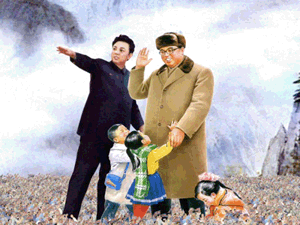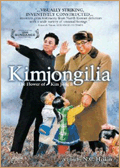Christmas Jeers

The Kim Dynasty is about to be swarmed by millions and millions of bees (aka insectus ouchus Kimjongstingya)
On December 18th internationally acclaimed Iranian director Jafar Panahi (1995’s White Balloon, 2006’s Offside) was convicted of ‘colluding’ against the Iranian Islamic Republic by the country’s courts and sentenced to 6 years in jail. Additionally, for the next 20 years he’s banned from writing scripts, making films, travelling abroad, and giving any interviews – this within a week after a 7-day retrospective / celebration (Dec. 2-9) of the director’s work at the Tiff Bell Lightbox.
A number of acclaimed American directors have spoken out against the conviction & heavy sentencing, but what’s happened isn’t a justice system meting out punishment for breaking rules – it’s just bullying, using every available venue of punishment under its control, which unfortunately is everything within the legal and judicial system.
Panahi’s sentence also seems ludicrous and archaic because it’s what one would’ve read about when China and the former Soviet Union were more secretive and totalitarian; suppression of films and talent goes on, but at least among some of the former high-profile perpetrators, things have changed because of economics (money = good), and the need to be perceived as having embraced free-thinking, free-market concepts; some level of criticism is allowed because it presents the image of a permissive regime when there’s probably still sensitive figures whose first instinct would be to crush, but they only react when the annoying independent voice just won’t shut the hell up.
That’s maybe Panahi’s dilemma, but it hardly helps Iran’s international image.
The woman who made international headlines for being sentenced to death by stoning for murdering her husband with her lover was briefly ‘released’ this month so that she could return to the ‘scene of the crime’ and recreate for TV viewers how she allegedly killed her sleeping husband. From the brief excerpts in the western media, it looked like some trashy reality show, except it was a government sanctioned, high-concept production: ‘Let’s reinforce the image of the woman’s guilt for the masses so at least people at home will be on our side and find international pleas and criticisms offensive.’ Reportedly included in the broadcast were stills of the dead husband’s corpse to reinforce a sense of horror.
Those in media-savvy countries are bombarded by commercial abuses of technology that warps the morality and public taste. There are reality shows on everything, but our exposure to mundane and garbage subject matter, as well as manipulative filmmaking techniques, means our collective sense of when the bullshit smells is High. We know when we’re being provoked.
Ergo, the woman’s ‘return to the scene of the crime’ may be a violation of her civil rights and an exploitation of a sad situation, but it’s also crass exploitation no different than putting a an alleged killer and the family of his / her victim on stage, with a Jerry Springer-styled audience designed to sweeten the provocative meeting for the cameras and sound mixers.
The Iranian broadcast of that ‘How I did it to my sleeping husband’ put the network on par with Fox TV; the content wasn’t important, but its effect on viewers was vital, and so it goes with Panahi’s conviction. Admittedly, there is a difference between spousal murder and protesting with the Green movement (which is what ultimately exhausted the regime’s patience for Panahi), but the government’s handling of the cases is about affecting the public for control, not to reinforce what’s morally right.
The dilemma for the government is that it’s trying to maintain a restrictive hand on a culture that’s old, wise, and is media savvy, and the use of Twitter during the 2009 elections, as well as getting video footage of abuses inflicted upon Green members to international media markets demonstrates ordinary people can use images and sounds just as effectively in getting their personal points across. Unlike North Korea, Iran is tech-savvy, and they have the gear to disseminate their own information.
Panahi’s sentencing reads like a plot extract from some HBO TV movie or documentary about a Soviet era composer silenced by Stalin because he disliked the composer’s use of satire and socio-political commentary. Dimitri Shostakovich managed not only to persevere and still write music, but he outlived the despotic sonofabitch and won.
Only one of the two is admired, studied, and respected around the globe as a cultural influence; the other’s just a monster whose lone virtue was firming up a nation against Nazi invaders during WWII, and whipping their arses on the snow.
In a classic capitalist society, if your work sucks, no one will buy it. If the studio has little faith in it, they’ll dump it on Labor Day weekend or video. If a studio or producer destroys it or shelves it, you can go to the media and embarrass your target(s) with the worst case scenario being a defamation suit – not arrest, government suppression and conviction for protesting too much.
Panahi will be able to write scripts in his mind, but the prison term will break something, and additional 14 years of silence might destroy the desire to persevere and express ideas again on film. It’s not a crime against the republic; it’s a nasty regime saying ‘We told you to shut up, and you didn’t listen. Now we’re going to destroy you.’
.
* * *
.
 Meanwhile, as this drama breaks wind in the media, the tensions between North and South Korea keep getting tighter, and creepier. It’s as though the North’s Kim Jong-Il is repeatedly egging the South if it wants to play a game of Global Thermonuclear War.
Meanwhile, as this drama breaks wind in the media, the tensions between North and South Korea keep getting tighter, and creepier. It’s as though the North’s Kim Jong-Il is repeatedly egging the South if it wants to play a game of Global Thermonuclear War.
The North is like a big child in the corner who screams and spittles whenever it feels no one is coming over from the big group of kids in the sunny playground to play a private game of checkers because everyone knows you cheat.
It’s also because you’re a creepy kid and habor weird ideas of self-adulation, as evidenced by a crayon drawing of you being ten feet tall in a green field, the other kids kissing your bare feet, and the teachers nailed to crosses that pepper the mountain horizon. You didn’t even put X’s on the their faces; you drew eyes with big blobs of tears falling to the ground where they help germinate some brightly coloured flower named after you.
You’re not liked because you’ve created a cult in which you’re a God, and instead of flinging elastic bands and spitballs at others, you just tell them if they don’t love you unconditionally, you’re going to kill something they love, and maybe take away their lunches and dinners for the next 10 years.
N.C. Heikin’s documentary, Kimjongilia (2009) [M]– named after a reddish flower in honor of the Son of Dear Leader – isn’t perfect, but there are enough disturbing tales by refugees from the North that paint a portrait of a weird world that’s Orwellian and Gilliam (minus the bossa nova tune).
In the 2006 documentary Comrades in Dreams, we’re shown a clip from a North Korean film about a daughter who isn’t crazy about an arranged marriage to a man devoted to the cultural improvement of pickled, spicy cabbage (kimchi). In the end she acquiesces, presumably because he’s either got a great cucumber between his legs, she’s swayed by family honor issues, the secret police stepped on her pet goldfish (improperly named ‘Kimjongcuda’), or the allure of cabbage proved too forceful.
I dunno, but it’s the kind of product made in a vacuum created by a regime steeped in ideology and a mandate to keep the cult saturated within the human brain, and that’s what makes Kimjongilia so horrific – the scarred lives and brutalized psyches the regime knows are unable to mount any kind of change from within or outside its borders.
The cruelties in the 2009 doc are contrasted by the regime’s fixation on order, grand architecture, and blazing pastel colours – elements beautifully captured by photographer Eric Lafforgue, samples of which are archived on Flickr.
After reading the review of Lorber’s DVD, do check out Lafforgue’s really beautiful photos, starting with a festival devoted to the Kimjongilia flower, and the weird mega-dance that brings thousands to the central square in Pyongyang for one hour.
That kid in the corner needs special medication.
.
.
Mark R. Hasan, Editor
KQEK.com
Category: EDITOR'S BLOG, FILM REVIEWS

















Connect